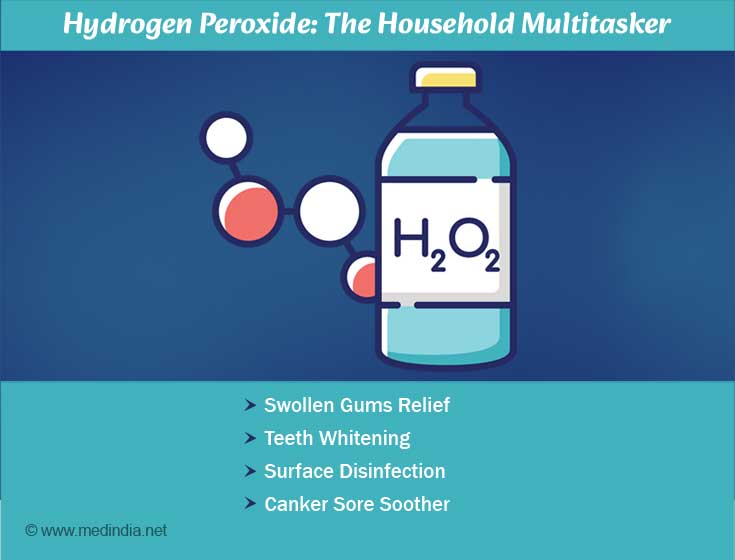- Hydrogen Peroxide - (https://pubchem.ncbi.nlm.nih.gov/compound/Hydrogen-Peroxide)
- What Is Hydrogen Peroxide Good For? - (https://health.clevelandclinic.org/what-is-hydrogen-peroxide-good-for)
- Dandruff - (https://www.mayoclinic.org/diseases-conditions/dandruff/symptoms-causes/syc-20353850)
- Top 10 BEST USES of Hydrogen Peroxide - (https://www.safesol.co.uk/top-10-best-uses-of-hydrogen-peroxide/)
- Contact Lenses: Safe Use of Hydrogen Peroxide Solution - (https://www.fda.gov/consumers/consumer-updates/contact-lenses-safe-use-hydrogen-peroxide-solution)
- Hydrogen Peroxide for Ear Infections /Wax - (https://eyeandear.org.au/patients-visitors/fact-sheets/hydrogen-peroxide-for-ear-infections-wax/)
- Hydrogen peroxide: a review of its use in dentistry - (https://aap.onlinelibrary.wiley.com/doi/10.1902/jop.1995.66.9.786)
About
Hydrogen peroxide is a clear, colorless liquid with a slightly bitter taste that you’ve probably seen in many households. It’s a common product used in low concentrations (3-9%) for cleaning wounds, whitening teeth, or bleaching hair and clothes. Interestingly, small amounts of it even exist naturally in our air.
Did You Know?
Hydrogen peroxide may kill acne-causing bacteria, but it's not ideal for treating acne. It can irritate the skin and worsen breakouts. Benzoyl peroxide or salicylic acid is a better choice. #acnetreatment #skincare #medindia
What makes hydrogen peroxide special is how it breaks down easily into water and oxygen, releasing heat in the process. It’s known for its bubbling reaction when it comes in contact with organic material, making it an effective disinfectant(1✔ ✔Trusted Source
Hydrogen Peroxide
Go to source).
It can be beneficial in many situations, but improper use can cause harm. Despite its versatility, handling it carefully and understanding its uses and risks is important.
How to Use Hydrogen Peroxide Safely in Daily Life
1) Cleaning Wounds
Hydrogen peroxide is commonly used to clean wounds because it kills germs on contact, thanks to its bubbling reaction that releases oxygen. While effective at killing bacteria, it can also damage healthy tissue around the wound, slowing the healing process(2✔ ✔Trusted Source
What Is Hydrogen Peroxide Good For?
Go to source).
Safer Alternative: Use soap and warm water to gently clean cuts. Save hydrogen peroxide for emergencies when clean water isn’t available.
When to Avoid:
- Deep wounds
- Burns
- Persistent irritation after use
2) Earwax Removal
Excess earwax can cause discomfort, temporary hearing loss, or a blocked feeling. Hydrogen peroxide softens earwax, making it easier to remove. Always consult your doctor before using hydrogen peroxide in your ears(8✔ ✔Trusted Source
Hydrogen Peroxide for Ear Infections /Wax
Go to source).
How to Use Safely:
- Always use a 3% hydrogen peroxide solution.
- Draw 1 -2 ml of hydrogen perioxide in a plastic syringe.
- Using the syringe place few drops in the affected ear.
- Tilt your head to the side with the affected ear facing upwards to allow the solution to reach the earwax.
- You will likely hear a bubbling sound as the hydrogen peroxide reacts with the earwax.
- After a few minutes, gently tilt your head to the opposite side to allow the solution and loosened earwax to drain out.
- If you experience any pain, discomfort, or bleeding, stop using hydrogen peroxide and consult your doctor immediately.
3) Swollen Gums
Swollen gums can result from poor oral hygiene, injury, or gum disease. Hydrogen peroxide, diluted with water, can reduce bacteria and inflammation.
How to Rinse:
- Mix 1 part hydrogen peroxide (3%) with 2 parts water.
- Swish in your mouth for 30 seconds, then spit it out.
- Do not swallow.
A saltwater rinse is a gentler alternative. If the swelling lasts longer than 7 days or is accompanied by bleeding and pain, consult your dentist.
4) Canker Sores
Canker sores are small, round ulcers inside the mouth that can cause significant discomfort. Hydrogen peroxide mouth rinses (available over the counter) can help reduce pain and speed up healing(9✔ ✔Trusted Source
Hydrogen peroxide: a review of its use in dentistry
Go to source).
How to Use:
- Swish the rinse in your mouth as directed, then spit it out.
- Avoid overuse, as it can irritate the tissues if used too frequently.
Even without treatment, most canker sores heal within a week.

5) Teeth Whitening
Hydrogen peroxide is a key ingredient in teeth-whitening products. It works by breaking down stains on the enamel.
Options for Whitening:
- At-Home Products: Whitening strips or gels with hydrogen peroxide.
- Professional Whitening: Dentists use a stronger concentration for faster results.
Overuse can erode enamel and irritate gums. It may cause temporary tooth sensitivity.
Consult your dentist before starting any whitening treatment to ensure safety and effectiveness.
6) Hair Dye
Hydrogen peroxide is used in hair bleaching and dyeing because it lightens hair by breaking down its natural pigment.
How to Use Safely:
- Follow the instructions on the product carefully.
- Perform a patch test to check for allergies.
Overuse can cause scalp burns or irritation, dry, brittle and thinning of hair.
7) Treating Seborrheic Keratoses
Seborrheic keratoses are harmless, wart-like skin growths that often appear after middle age. A topical hydrogen peroxide-based prescription treatment can help remove these growths. Consult your doctor to discuss this option and get a prescription.
8) As a Disinfectant
Hydrogen peroxide is a powerful disinfectant widely used to kill bacteria, viruses, and fungi on surfaces. It works by releasing oxygen, which destroys the cell walls of harmful microorganisms. Hospitals use it to combat tough pathogens like norovirus and cryptosporidiosis, which are resistant to many other cleaners.
At home, it can disinfect surfaces like countertops, bathroom fixtures, and cutting boards, making it a versatile and effective cleaning agent when used properly.
9) Acne Treatment
Hydrogen peroxide can kill bacteria, but it’s not recommended for acne as it’s short-lived and may irritate the skin, potentially worsening breakouts. Instead, opt for benzoyl peroxide or salicylic acid, which are more effective and designed to target acne. Consult a dermatologist if breakouts persist.
10) Myths About Cancer Treatment
Some claims suggest hydrogen peroxide can treat cancer. These claims are false and dangerous. Drinking or inhaling hydrogen peroxide can cause severe harm, including:
- Internal burns
- Nausea and vomiting
- Breathing difficulties
Always rely on proven medical treatments and consult your doctor before considering any alternative therapies.
Household hydrogen peroxide is typically 3%. Higher concentrations (used for industrial purposes) are dangerous and should not be used for personal care. Never drink or inhale hydrogen peroxide-it can be toxic. Keep hydrogen peroxide in a cool, dark place and out of reach of children.










